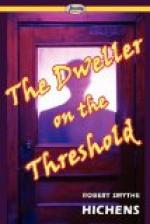Very different was the effect created by Chichester’s sermon in the evening. Malling, aware though he had become of the great strengthening of Chichester, was amazed when he heard him preach.
Often it is said of a very fine preacher that he preached as one inspired. Chichester preached as one who knew. Never before had Malling been so impressed with the feeling that he was listening to truth, absolute truth, as he was while he listened to Chichester. There was something, though, that was almost deadly about it. It pierced like a lancet. It seared like a red-hot iron. It humbled almost too much. Here was no exaggerated humility, no pleading to be borne with, no cringing, and no doubt. A man who knew was standing up, and, with a sort of indifference to outside opinion that was almost frightening, was saying some of the things he knew about men, women—and surely God!
The subject was somewhat akin to that of the first sermon of Mr. Harding which Malling had heard. The rector then had preached on self-knowledge. The curate, now, preached on hypocrisy. Incidentally he destroyed his rector’s sermon, flung it away on the scrap-heap, and passed on. This was not done viciously, but it was done relentlessly. Indeed, that was the note of the whole sermon. It was relentless, as truth is relentless, as death is relentless. And besides being terribly true, it was imaginative. But the preacher almost succeeded in conveying the impression to his congregation that what is generally called imagination is really vision, that the true imagination is seeing what is, but is often hidden, knowing what is, but is often unknown. The latter part of the sermon struck Malling as very unusual, even as very daring.
The preacher had spoken of the many varieties of hypocrisy. Finally he drew a picture of a finished hypocrite. And the man lived as a man lives in the pages of a great writer. One could walk round him, one knew him. And then Chichester treated him as the writer treats his creation; he proceeded to show his hypocrite in action.
The man, happy, almost triumphant,—for he now often looked upon himself with the eyes of others who knew him not,—was walking to his home on a winter’s evening along a country road, passing now and then rustics who respectfully saluted him, neighbors who grasped his hand, children who innocently smiled at him, women who whispered that he was a fine fellow, the clergyman of his parish, who gave him God-speed upon his way as to one who deserved that God should speed him because his way was right. Snow was upon the ground. Such light as there was began to fade. It was evident that the night, which was very still, was going to be very dark. And the man stepped out briskly. Presently, at a lonely part of the road, happening to look down, he saw footprints in the freshly fallen snow. They were of feet that had recently passed on the way he was following. They had attracted, they continued to attract, his attention, he knew not why. And as he went on, his eyes were often upon them.




